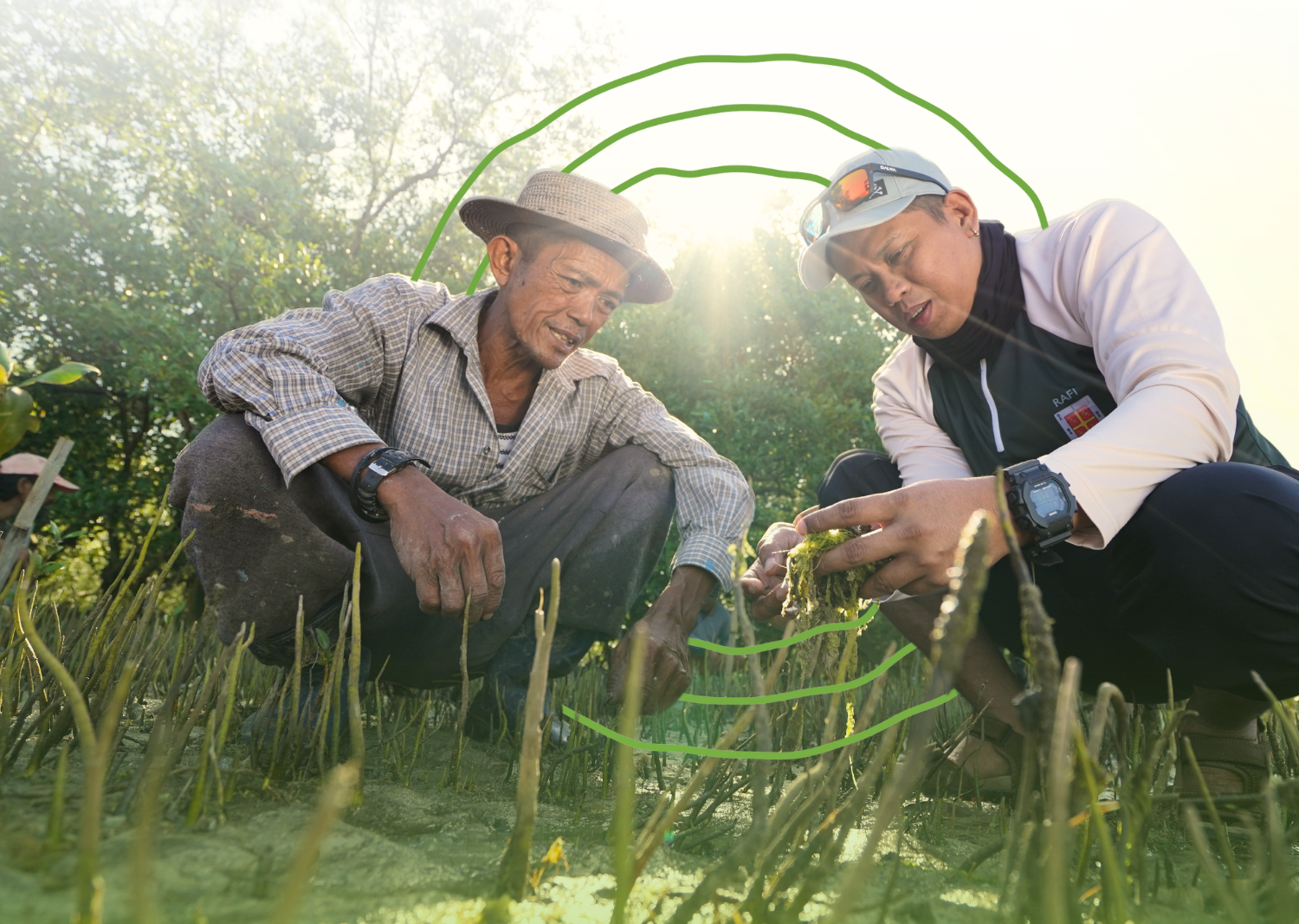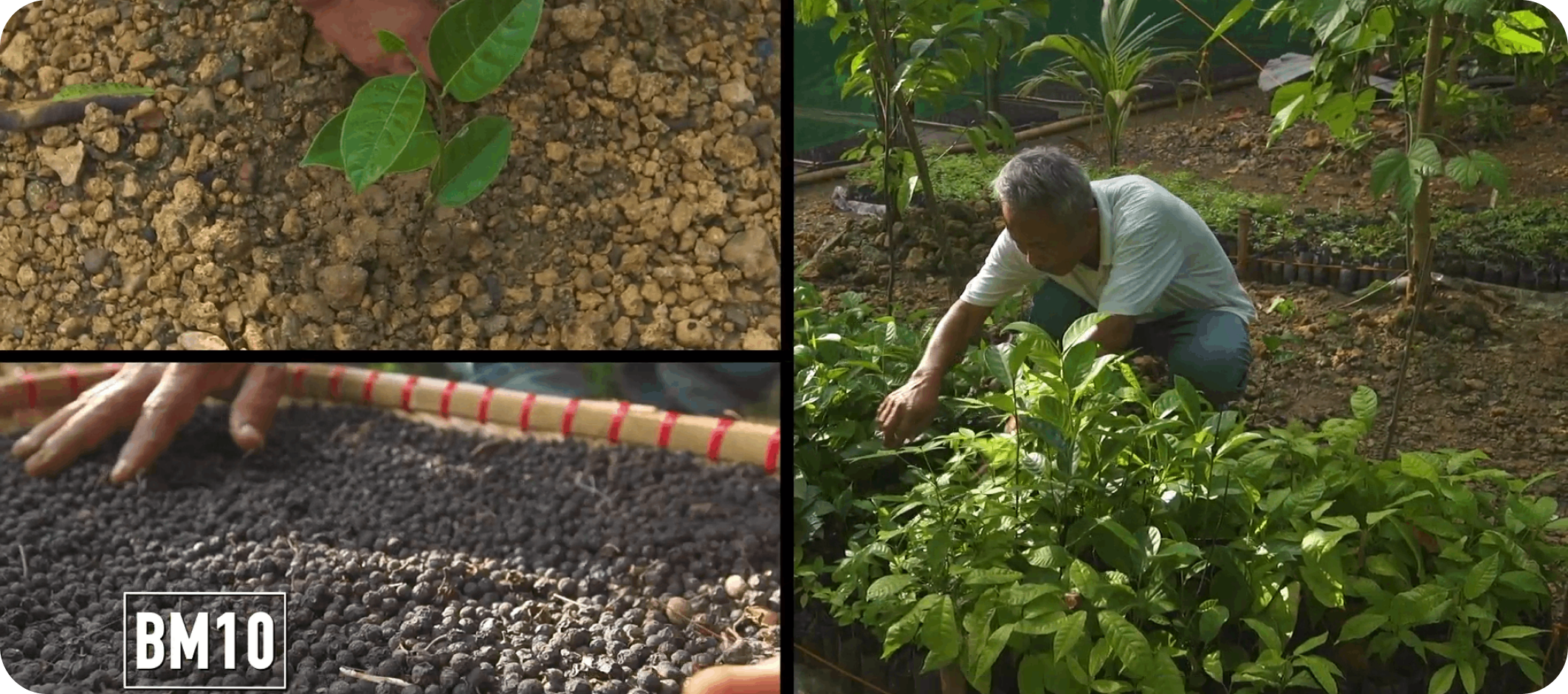
“He who plants a tree, plants a hope.” – Lucy Larcom.
Farmers are the backbone of our society. They provide a significant portion of our food supply by working tirelessly during every season to ensure that we have food on our tables.
This year, in RAFI One to Tree’s first Ka-Treebu Assembly, we got close and personal with two partner farmers from Davao to share their journey to understanding the beauty of native tree growing.
Oscar M. Sarahan, the Chairman of the Matigsalug Manobo Tribal People Council of Elders Davao (MAMATRIPCEDI), admitted that he initially failed to grasp the significance of cultivating native trees. Like many, he had previously participated in conventional tree planting activities without much consideration for sustainability or the long-term survival of the trees. However, his perspective shifted when RAFI One to Tree introduced a project focusing on native and fruit-bearing trees. It was through this initiative that he discovered the remarkable benefits and positive impacts on both him and his community.
“Karon pa lang gyud ko nakabalo ana. Kana wala ko kasabot unsa na ang one to tree, abi man nako na literal ra ang iyahang meaning bitaw. Ang iyahang explanation kay naa siyay lalom gipahiwatig ba. […] So, magsugod kag gamay nimo nga contribution paingon sa dako. […] Ang uban man gud kay pabigla halimbawa kani magtanom tag kahoy one thousand, mag imagine palang daan ang tao kay “Kadaghan ba ani?” pero kung kanang muingon kag mag tanom tag tulo, usa o duha o tulo ka kahoy, murag gaan lang siya sa pamati dili pud lisod para sa ilaha,” Oscar shared.
“I only learned about it just now. I thought ‘one to tree’ was literally its meaning. The explanation of the idea of One to Tree indicated a deeper intention. […] So, you can start with a small contribution towards a bigger goal. […] Others tend to be overwhelmed; for example, if someone plans to plant a thousand trees, people might think, ‘That’s a lot!’ But if you say you’re planting three, one or two trees, it seems more manageable to them,” Oscar shared.
Actively engaging in face-to-face interactions with fellow farmers, Oscar, makes sure that his members also understand the significance of the project through tangible actions rather than mere words. True to the Bayanihan spirit, group members support each other in planting trees if the individual target is not met. Fostering teamwork and collaboration within the group, this ensures successful completion of the project.
“Daghan baya ug taw nga nanginahanglan pud. Para ma sustain ang project, mao na amoang ginabuhat. Ginaistorya namo face to face ang farmers tapos sa akoa sang pag-estorya, gina-present namo kanunay ang importansya sa project. Dili ra man ni ang pagtabang nila– ang pagtanom namo. Sa karon man gyud, kinahanglan nato ang partnership. Ilabi na sa pagtubag sa problema dili ra ba usa ka tao ang concern ana, kita man tanan. So kinahanglan ang kolaborasyon sa tanan either government, non-government, LGU ug mismo ang community. Naa gyuy collaboration para ang project ma-implement ug ma-sustain gyud. Ang kanang mga strategy namo, mao nay nakatabang sa amoa. Dili man nato totally ma-ingon nga 100% at least 70 to 80% naa gyud ta ana,” he expressed.
“A lot of people have needs too and we talk face-to-face with the farmers to sustain the project. In my discussions, we always present the importance of the project. Now, we really need partnership especially in addressing the problem. It’s not just one person’s concern, it’s everyone’s. So, collaboration is necessary from everyone, whether it’s government, non-government, LGU, and even the community itself. There’s collaboration so that the project can be implemented and sustained. Together, our strategies can make a difference. We can’t say it’s 100%, but at least we made 70 to 80%,” he expressed.
“Ang usa lang ka term “collaboration”, tungod kay nakita nako una, si RAFI makipag link pud siya sa DENR, which is thankful pud ang DENR kay naa pud silay plano nga ma implement sa ilahang jurisdiction nga inline sa plano sa RAFI. Naa diha ang pagtinabangay, ikatulo, ge tag nila ang different people’s organization. […] Gikan anang pagtinabangay, didto sa P.O (people organization) naa pud participation ang matag individual, family based.
Gikan sa family based naapil pud to ilang mga miyembro sa pamilya, ug tan aw nato ganiha naay bata nag tanom. […] Kung wala ni si DENR, wala si community, og wala si P.O, wala to ang indibidwal, wala gyud mabuhat. […] Mao tong ganiha, naay nakamention ganiha, ang issue nato karon, dako kaayo pero naa tay nabuhat. Nabuhat nato pinaagi sa pagtambayayong sa matag usa. Pinaagi sa pagpaambit sa idea, techniques ug effort sa matag-usa para mabuo ang project, so kolaborasyon,” Oscar says.
One word that sums up everything today is: “collaboration”. I noticed that RAFI also collaborates with DENR, for which DENR is also grateful because they have plans in their jurisdiction that aligns with RAFI’s goals and plans. There’s cooperation with different people’s organizations. […] From that collaboration, in the P.O (people’s organization), everyone has participation, that cascades to the member’s families.
Even the family members are involved, and as we saw today, there’s a child planting. […] If it weren’t for DENR, if there weren’t the community, if there weren’t the P.O, and the individual, nothing could be done. […] So today, there was a mention earlier, the issue we have is significant, but we’ve accomplished something. We accomplished it by working together. By sharing ideas, techniques, and efforts from each individual to complete the project, that’s collaboration,” Oscar says.
Planting and gardening have been deeply ingrained in his family’s traditions, passed down from generation to generation.
Diosdado Mampao, a 59-year-old resident of Barangay Marilog (tribu Matigsalug), holds the position of Vice President. From his early years, he learned the art of nurturing plants alongside his parents, cultivating a love for nature and the satisfaction of watching life unfold from tiny seeds.
As time went on, he embraced his role as a parent and eagerly shared his love for planting with his own children.
“Kami sa una mag maisan og kanang humay, sa pagkakaron nga naa nag lain mga pamaagi sa pag uma sama sa pag tanom sa gulay, mao nay mga sustainable nga panginabuhi nga mag gulay-gulay mi,” Diosdado said.
“We used to focus on corn and rice farming, but now, with various sustainable farming methods such as vegetable cultivation, we are transitioning to a livelihood centered around vegetable farming,” Diosdado said.
Serving as his way to contribute to the plight to increase forest cover in his community, Diosdado actively participates in the tree growing initiatives through RAFI One to Tree.
“Ang akoa experience nila pag apil aning programaha una, ngano ni apil ko aning programaha sa pag tanom og kahoy, wa mi lain tungon ang pag protekta sa kinaiyahan. Mao to gitabangan mi sa Aboitiz ang membro sa Aboitiz sa amoa 250 ka individual ka tao, didto nga mananom og mga kahoy dili lang kay sa kahoy ang ilang gipangtanom, apil pud ang mga cacao, prutas gipatanom nila na hantud karon nagpadayon ang pag tanom sa kahoy,” Diosdado explains.
“In my experience, the reason I joined this program in tree growing, is that we had no other response to environmental protection. That’s why Aboitiz (RAFI) helped us. There are 250 members of this project who plant both native and fruit bearing trees, including cacao and they still continue to plant trees.” Diosdado explains
The Matigsalug Tribe which Diosdado is a part of, is determined to revive and safeguard the environment through tree growing, while also addressing pressing issues like landslides, which have inflicted significant damage upon them.
“Amoang mga sumusunod na generation og mga wala nami mga ginikanan naa silay mapanunud nga amo mga anak. Mao na siya ngano nahagit mi gumikan kay ang amo area, na action nag ka opaw. Mao nang nag pasalamat mi sa RAFI kaning Aboitiz sila gyud nag hatag og kinabuhi nga mapadayun namo ang pag pananom og kahoy,” he said.
“We continue to plant for our benefit and for the succeeding generations. We hope that after we pass, our children can sustain this practice of tree growing. We were motivated to do this project, because our area was becoming barren. We’re very thankful to RAFI and Aboitiz; for they helped us sustain our ongoing tree growing projects,” he said
The program allowed farmers to engage with one another, ask questions, and offer solutions to farming challenges, fostering a sense of community.
“Nalipay kaayo ko nag kahiusa ang tribu para sa pag tinabangay sa pag pananom og kahoy para pag protekta sa kalikasan. Nalipay gyud ko og wako nag mahay nga ni ari ko deri sa Cebu mas lapad ang lugar, unya pud ang mga tao deri kay mga bisaya pud magsinabtanay gyud,” he expressed.
“I am very happy that we are united as one tribe, helping each other in tree growing practices and contribute to protect the environment. I am truly happy and have no regrets that I came here in Cebu; the place is wider, and the people here, being Bisaya, truly understand each other,” he expressed.
In the ever-changing world, where technology often takes center stage, the simple act of planting and tending to a garden remained a constant source of solace and fulfillment for him and his family. It was a reminder of the beauty of nature, the cycle of life, and the enduring connection between generations.
“Mas importanti kita gyud naa tay responsibilidad na mananom tag kahoy tungod kay diha ta na tao diha ta nag tubo sa atoang lugar. Mao nang interesado ko ngano kinahanglan jud mutanom og kahoy alang-alang sa sumusunod na henerasyon kay kung wala nay kahoy kinsa may mag-antos ang atoang sumusunod na henerasyon.
Ang deperensya gyud sa walay kahoy maam, una init ang lugar, wakay hangin nga presko ma hanggap tungod kay wanay kahoy. Mao na akong ikasulti deri, ako nalipay ko kay nagkahimamat ang matag tribu na diay dili lang sa matingsalob ang tribu kundi naapa diay laing-laing mga ka tribu. Nahatagan tag kahayag sa pag-lantaw sa unahan nga kung mananom ta sa kahoy og uban pang mga tanom naatay pag mahal, naatay gugma sa atoang tanom,” Oscar elaborated.
“It’s really important for us to take responsibility to plant trees because this is our only home. That’s why I’m interested, in understanding how necessary it is for us to plant trees. This is also for the next generation because if there are no more trees, the succeeding generation will suffer the most.
The difference without trees, ma’am, first, the place becomes hot, there’s no fresh air because there are no trees. That’s what I can say here; I am happy because through this program, I realized that its not just our tribe that is growing trees, I met other “katreebu’s” with the same intention and drive. It shed light on the realization that if we plant trees and other plants, it’s an act of love, an act of care for our plants,” Oscar elaborated.
Leading by example, Diosdado encourages and calls upon the youth and fellow community members to engage in tree growing. He emphasizes the importance of assuming responsibility and actively participating in the preservation of the remaining biodiversity. Diosdado envisions a future where generations to come can appreciate the beauty of nature.


